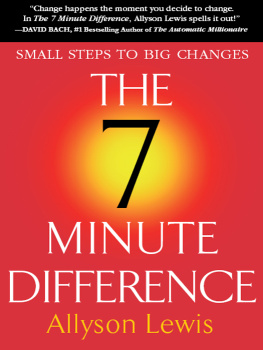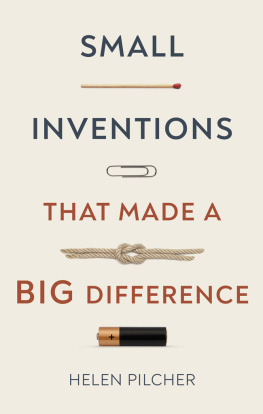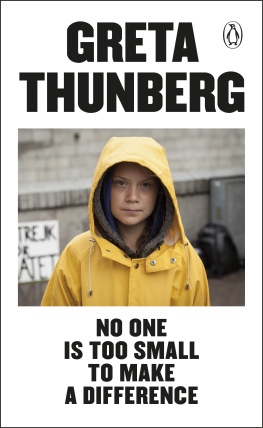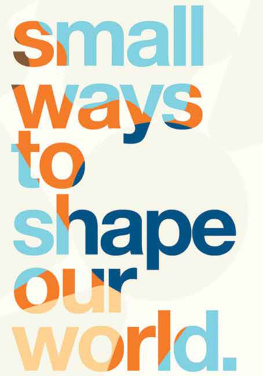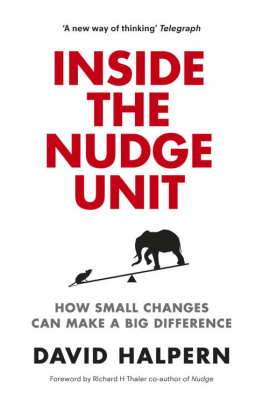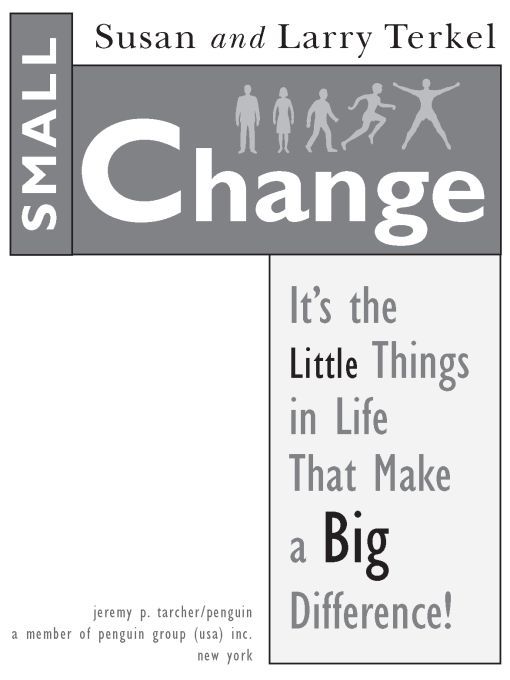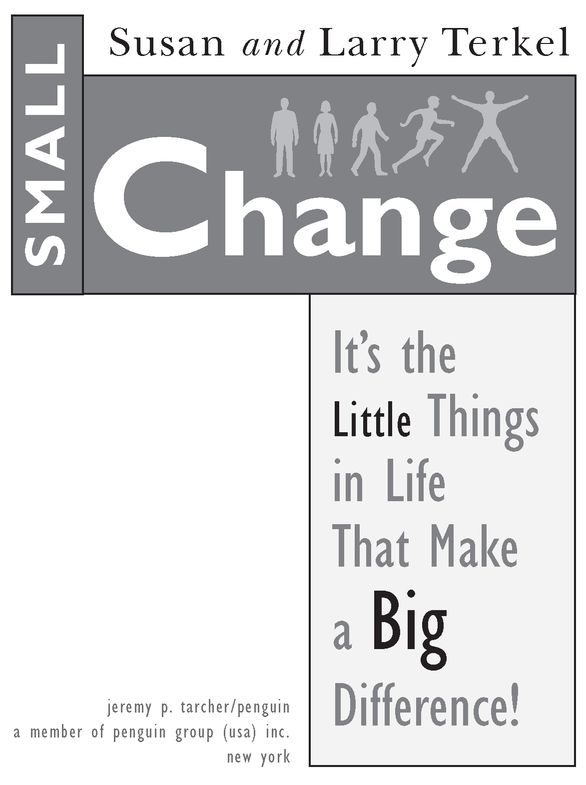Table of Contents
Acknowledgments
Our deepest appreciation goes to our dear friend Lorna Green-berg, for her remarkable generosity, from first draft to final deadline. We would also like to express gratitude to our agent, Harvey Klinger, for his enthusiasm and wise counsel, and a special thank-you to our editor, Sara Carder, for embracing the concept of small change and displaying such stewardship toward it.
Several kind souls read over the manuscript in its various stages and gave us honest and (thankfully) constructive criticism, as well as moral support. Thank you to Pat Jenkins, Greg Cloyd, M.D., Nancy Livingston, Margaret Tucker, and James Wilkens.
For inspiring so much of the wisdom and humor in the book, we thank our beloved family, especially our parents, Deborah and Sidney Neiburg and Ruth and Maury Terkel, and our children, Ari and Alicia Terkel, Marni and Jason Gardner, and Dave Terkel.
Much information had to be researched, and many facts had to be checked. For this we want to thank Alyse and Peter Blumberg, Marc Terkel, Rabbi Susan Stone, Kevin Aiken, D.D.S., Joshua Rubin, Paul Nowell, Molly White, Mitch Fromm, M.D., Deborah and Ted Furst, Ed and Joan Broadfield, Don Bak, Bob Dean, Hudson Library & Historical Society research librarians Lou Dobos, Matt Tarczy, Margie Smith, Monica Knooihuizen, and Mary Kenney and the American Automobile Association.
Sometimes we just needed to run an idea by someone. Thank you, Katie Coulton, Ann Hanna, Stephanie Stanziano, Marilyn Wise, Dean White, Jenny Marino, and Joel MacDonald.
Max Weinstein, you are our hero, for the important small change you made in your life after reading one of the chapters.
Thank you to Rick and John Hanna for letting us make Say-wells our office away from home. What a great place to read and write.
Speaking of places, we would like to acknowledge how much we have learned over the years at Omega Institute, Kripalu, the Chautauqua Institution, and the Yoga Retreat on Paradise Island.
Finally, thank you to all the other people who taught us what we wanted or needed to learn, including Naomi and Jerry Burstein, Bernice Davidson, Sue and Bert Goldberg, Annie Mae Hardaway, Joe Moran, Joshua Halberstam, Ph.D., Neil Thackaberry, George Klein, B.K.S. Iyengar, Paula Rubenstein, Sally Brashear, Kim Saporito, Susie Hughes, Rabbi David Wice, Pir Vilayat Inayat Khan, Swami Satchidananda, and Larrys students at the Spiritual Life Society. Thank you to Matt and Gennie Lerner, Joan Brandon, Rob Blaine, Carson Heiner, and Joan Van Osdol for sharing our vision there.
One piece of advice in this book is to remember to count your blessings. We feel blessed by all the people who helped us on this project, not only the ones we have just singled out but all those who have given us the spiritual richness we treasure in our lives.
In memory of
Larrys beloved mother,
Ruth Klein Terkel,
and
Susans beloved uncle,
Jerome A. Burstein,
who appreciated a good workout,
a good relationship,
a good deed,
and a good joke.
Introduction
A Better Way to a Better You
Small change adds up. This is worth repeating: small change adds up. Empty your small change into a jar every day, and watch the total add up over time. Make small changes in your daily habitssuch as your meals or snacks, your relationships, your work, or your leisureand watch those changes gradually accumulate into a much healthier, happier, and more satisfying life.
An angle of only one degree is difficult to draw on a piece of paper. It is too small. If a flight from New York to Los Angeles is off course by just one degree, the plane will arrive closer to Tijuana, Mexico, than Los Angeles. The farther it travels, the more widely it misses its destination.
This is what happens to us in life. We drift off course. What once seemed like a fabulous job has become tedious or frustrating. What was once a great relationship has lost its luster. The body has drifted out of shape. Like the pilot, we find ourselves off course. What are we to do?
Many advice-givers say to change direction completely. These advisers usually suggest radical changes or big makeovers. Returning to the New York-Los Angeles flight analogy, the advisers might say to change planes in Chicago. Worse, they might even suggest that the pilot return to New York and start over!
But there is good news. Small changes can get us back on course as easily as they can lead us off course. Either for you or against you, small change adds up.
Here is more good news. Your life is probably not as big a mess as you think. You are not bad, weak, unlovable, or out of control. People in search of self-improvement are usually just off course. Our transcontinental pilot needs to make only small adjustments along the way in order to arrive at the desired destination.
Granted, there are times in life when a big change is necessary. An abusive relationship or a life-threatening disease may need immediate and dramatic action. Most problems, though, have not reached the crisis stage, and for those problems, a small change approach can be the best way to go.
Small change is powerful. The power of small change lies in how much easier small changes are to initiate and maintain, and how meaningful are the patterns they create.
Replace a soft drink with water at just one mealsay, lunch. With this small change, you will drink approximately forty more gallons of water per year, while not drinking forty gallons of carbonated sugar. You will also save up to fifty thousand calories and as much as five hundred dollars.
Walk to the next bus stop instead of the closest one. In one year, you will walk more than 150 miles more than if you had not changed your routine. This is the equivalent of walking from New York to Philadelphia and back each year. In ten years you will have walked more than 1,500 miles.
Consciously say, I love you, at the end of every phone conversation with a life partner, and it will reinforce the message for both of you, adding tens of thousands of endearments over the course of a relationship. Small change adds up!
Small change is a gentle pathway to self-improvement. By making small changes, one at a time, you go easy on yourself. Youre not challenging yourself to become a new you overnight; you are tackling one small issue, such as taking a breath before reacting to small annoyances or doing three minutes of stretching in the morning. You give yourself positive reinforcement along the way as you succeed in making each small change. With each accomplishment you gain confidence in your ability to make changes.
Small changes, while not always easy, are easier than big changes or massive makeovers. We learned in high school science class that objects in motion will always follow the path of least resistance. We also learned the law of inertia: objects in motion tend to stay in motion, and objects at rest tend to stay at rest. Habits, especially those acquired over a long period of time, follow the same laws of natureperhaps the reason they are so difficult to change!
Small change suggests that you honor these laws by making a series of small changes rather than trying to change more than you can handle. Further, if you focus on just one habit at a time, you will face less resistance than if you focus on many at once. Look at the average dieter, for example. Using small change, she or he would focus on changing one behavior before moving on to the next change. This gentle approach is clearly easier than starting a daily exercise program



